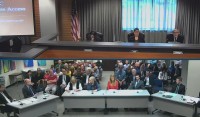
Global Partners, a company operating in the Columbia River estuary, is quietly assembling the pieces for a massive oil-by-rail terminal. The Oregon Public Utilities Commission (Commission) has final say on whether Global Partners can buy massive oil storage tanks from a neighboring industrial site at Port Westward, near Clatskanie, Oregon. The Commission can stop Global Partners’ tank farm expansion if it finds the sale is not “consistent with the public interest.”
Update: June 27, 2017: Oregon’s Public Utility Commission voted 3-0 to approve the sale of old oil storage tanks and other equipment at Port Westward to Global Partners—an oil company with a history of environmental violations.
Statement from Jasmine Zimmer-Stucky, Senior Organizer, Columbia Riverkeeper:
"The Oregon Public Utilities Commission's decision today put corporate profits before the safety of Oregonians and the Columbia River. Despite a legal mandate to protect the "public generally," the Commission ignored a rare opportunity to reduce the threat of oil-by-rail in communities along the Columbia River. Instead, the Commission joined several other Oregon agencies by putting on blinders and refusing to acknowledge the serious risk of oil-by-rail and oil spills. The Commission's decision puts a spotlight on Governor Brown and the Oregon Legislature as they consider critical legislation to protect people from oil-by-rail."
At the first Commission hearing on June 13, 2017, oil executives lined the front row waiting for a fossil fuel victory. They walked out empty-handed. Why? Compelling testimony from health professionals and concerned residents, plus over 1,000 public comments received by email, convinced the Commission to seek legal advice on the scope of their authority.
Background info:
In 2012, the company began operating as an oil-by-rail terminal under an existing approval for an ethanol refinery.1 By 2013, the company had violated their permit, public trust, and safety by illegally shipping six times more crude oil than allowed. In 2015, Global stopped handling oil due to the lower-than-expected price of crude oil and started operating an ethanol-by-rail terminal.2
What’s Next for Oil-by-Rail in the Pacific NW?
- Take Action: Calling for the amendment and passage of HB 2131
- In the coming months, Washington’s Energy Facility Siting Evaluation Council (EFSEC) will make a recommendation on the Tesoro Savage proposal in Vancouver, Washington. Ultimately, Washington Governor Inslee will make the final decision about whether to deny the terminal which would be the largest oil train terminal in North America. The project would bring up to five loaded oil trains each day through the Columbia River Gorge carrying the same volatile Bakken crude oil that burned during the Mosier derailment in June 2016.


